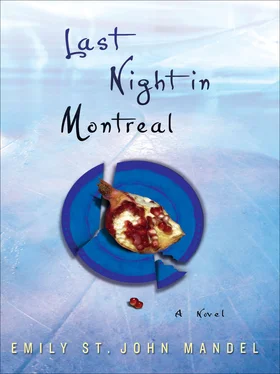Six months after Christopher had left his daughter in Montreal he pulled over to the side of the road in Oklahoma after a full day of driving, a little lost, and stared hard at the horizon for a while to clear his head. That was the first time he realized how long he’d been gone; in the next town he wired money to his daughter’s checking account and kept driving.
On Eli’s third week in the city he thought he heard Lilia’s name. It was one A.M. at the Café Depot, and he was waiting alone for Michaela to arrive; he looked up at the two girls speaking French at a nearby table, but waited until one stood up to leave before he made his approach.
“Excusez-moi,” he said awkwardly, to the girl remaining.
She looked up and smiled. “You sound like you’d prefer to speak English,” she said.
He found himself smiling back. “I would,” he admitted. “Thank you.”
“I’ve seen you here a few times,” she said.
“I’m sorry to disturb you. It’s just that I’ve been looking for someone in the city, a friend, and I thought I heard you say her name just now. Lilia?”
She shook her head, still smiling but puzzled, and then brightened suddenly. “Lillian,” she said. “Lillian Bouchard. We were just talking about her. That was the name you heard.”
“Oh,” he said. “I’m sorry, I didn’t mean to. .”
“It’s all right,” she said. She extended a hand. “Ondine. Where are you from?”
“Eli.” Her hand was soft and warm in his own. “Visiting from New York.”
“New York,” she said vaguely, and he understood from her smile that she’d never been. “First time in Montreal?”
He nodded.
“Welcome to the city,” she said.
“Thank you,” he said. “I’d ask you to join me, but I’m meeting someone. .”
“It’s all right,” she said. “I’ll see you again sometime. I hope you find her.”
“Thank you.”
He returned to his table and sat with his back to her, looking out at the cold grey street. He waited for Michaela every night until three A.M., until four, knowing she would eventually appear. Or he sometimes stood against a wall at Club Electrolite, watching her movements on her tiny stage, looking for Lilia in the crowd. The crowd barely noticed her, and it occurred to him one night that she was as much a fixture as the stage she stood on. She was like the disco ball that spun near the ceiling, throwing light into the crowded darkness; one more expendable component of an endless night, her reflection ricocheting endlessly between mirrored walls. There were two other regular dancers there whom he’d been introduced to, Marie-Eve and Veronique, but to his eye they looked bored and stilted, no match for Michaela’s loose-limbed extravagance. When the sound and the humanity got to be too much he pushed open the staff door, nodded at the bouncer who sat reading Dostoevsky just behind it, and made his way down to Michaela’s dressing room. The building vibrated with dance music around him, and the pipes made strange noises; it was a little like being in the depths of a ship.
Her room wasn’t large. There was a long counter with a sink, a chair beside a very small rickety table, and a clothing rack on wheels in the corner. Behind the clothing rack was a child-sized mattress, on which Michaela usually slept; it had a single sheet, a flat stained pillow, and an old quilt with little white sheep frolicking around the edges. He had a vision of Michaela as a very small child, lying under the sheep quilt in peaceful sleep, and on bad days the thought brought tears to his eyes. When he couldn’t stand the crowd on the dance floor he went down to her dressing room and sat there for an hour, two hours, three, trying to concentrate on the idea of Lilia and thinking instead of Michaela on the stage until her stiletto footsteps sounded softly on the worn carpet outside, until the cheap door opened and she closed it behind her and sank into the chair by the makeup counter. She had a way of absorbing the light when she came into a room. It didn’t make her brilliant; she emanated a certain quality of darkness, clear and vivid, a kind of negative light.
“You didn’t want to wait at the coffee shop?” she asked without looking at him.
“It’s too cold to go up there. I’ve been walking all day. I wanted to make sure you had a place to stay tonight.”
“Oh, it’ll get colder. Have you seen my pills? Did Jacques bring them?”
“They’re in the bag under the sink. Do you have a place to stay?”
She shrugged, not paying attention, pulling pill bottles from the paper bag that Jacques had brought and reading the labels. As far as Eli knew, she had no permanent address; she maintained a number of casual lovers and slept at their apartments sometimes. On other nights she slept in her dressing room. She was addicted to a complicated array of prescription medications, which the owner of the club helpfully provided. “He takes care of his assets,” was all she’d say when asked about this odd arrangement, and she refused to elaborate. The owner, Jacques, came into her dressing room in the evenings with brown bags of pills from the pharmacy, cans of soda, greasy takeout food. She picked halfheartedly at the food and threw most of it away. Jacques was a tall, sad-eyed man with a seemingly limitless collection of silk shirts and a resigned expression. Around him Michaela was quiet, almost muted; she said merci when he gave her the pills and the food and the soda and said little else. Jacques carried himself with an air of long-suffering calm and said almost nothing himself. He didn’t appear to have noticed Eli, which gave Eli the impression that he was far from the first guest to take up semiresidence in Michaela’s dressing room, and then he spent hours and days wondering why he was upset by this.
“I wanted to offer,” Eli said, “if you wanted to, you could stay in my hotel room. I’ll sleep on the carpet.”
“I don’t stay in hotel rooms.”
“I didn’t mean it like that.”
“It’s okay.” At length she selected two bottles from the paper bag that Jacques had brought her and swallowed a pill from each. “I have to go up to the VIP lounge in an hour anyway. I think I’ll just sleep here tonight.”
“Are you sure?”
“It’s too cold to go outside.”
He stood up awkwardly. “I’ll meet you here tomorrow, then.”
“Fine. Don’t come till afternoon.”
He stopped by the door. “Did Lilia used to wait for you like this?”
“Goodnight, Eli,” Michaela said.
The cold outside felt like death to him. He walked as quickly as possible toward the hotel, composing a letter to Lilia in his head. I want to find you. I want to disappear with you. I want to find you, and in the finding to make you disappear into me. I want to be your language. I want to be your translator. I want to be your dictionary. I want to be your map. I wish, I wish, I wish I knew where you are tonight. In the hotel room he wrote all of this down on hotel stationery, crumpled it up and threw it away. The words brought her no closer to him.
IN THE LATE AFTERNOON Michaela was worn and sleepy, a night creature blinking in the winter light. He met her at the side door of Club Electrolite and then had to wait while she ran back downstairs to get something she’d forgotten to put in her handbag. He paced back and forth in the frozen alleyway, jumped up and down to try to unthaw his feet, did a few jumping jacks and had to stop because the cold hurt his lungs, finally knocked on the door again. Another dancer opened it.
“Veronique,” he said, “I’m just waiting for Michaela. Could I wait inside?”
She had stringy blond hair and a suspicious way of looking at him, and he hadn’t been sure in their previous meetings whether or not she spoke English. She hesitated. He shivered impatiently in the landscape of grimy ice.
Читать дальше












